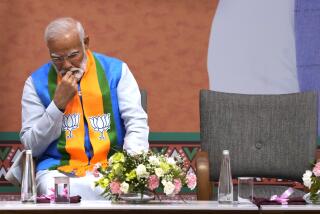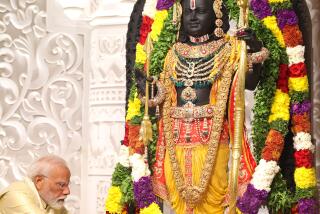India’s Prime Minister Faces Familiar Political Problems : Asia: Like President Clinton, Rao has been humbled by state elections, unpopular economic policies and scandal.
- Share via
NEW DELHI — Midway through the leader’s term in office, his party is still smarting from a first-rate hiding at the polls. Its image is tarnished by scandal, and its policies may have alienated most voters. A quick fix is hurriedly sought.
Sound familiar?
In this case, the humbled party and its chief are India’s Congress (I) and P.V. Narasimha Rao, prime minister of the world’s largest democracy.
Like President Clinton and the Democrats after getting hit by the “Newtron Bomb,” India’s Congress wallahs, who lost in three of four states where elections were held in November and December, are debating what went wrong and how to remedy it.
Human Resources Minister Arjun Singh, the No. 2 member of Rao’s Cabinet, argues that the government’s actions must quickly be given a more “human face” or further electoral disasters loom.
That analysis, not shared by everyone in the Congress leadership, interprets the debacle in the three states, Andhra Pradesh, Karnataka and Sikkim, as a rejection by voters of the party’s national policies, foremost of which is liberalization of the economy.
“The message is that weaker sections have not been able to understand as to how they will benefit from this policy,” Singh has said.
Sugar and securities scams in which some Congress ministers have been implicated have also marred the image of the venerable party of Mohandas K. Gandhi and Jawaharlal Nehru. Some commentators even suggest that the government is the most corrupt in India’s history.
Last week, A.K. Anthony, minister of civil supplies and a man regarded as above reproach, resigned rather than be made the fall guy in the sugar import scandal.
“In New Delhi’s business circles, it is now widely conceded that with Anthony’s departure, the Cabinet now has only one honest minister in place,” reported a former editor at Business India magazine.
After the electoral fiasco, 18 government ministers offered their resignations so Rao could refashion his Cabinet as he wishes. But the most powerful figures and those most tainted by scandal were not among them, even though Rao reportedly wanted everybody to formally resign to give him a free hand.
At first, it seemed certain that Rao would be compelled to rework his Cabinet. But in Parliament this week, he and his finance minister, Manmohan Singh, basically gave a clean bill of moral health to the most controversial ministers.
Opposition leaders in both houses indignantly demanded that Rao resign, but some later confessed delight at his apparent decision to tough it out. They view the survival of his government as the best way to guarantee the electoral suicide of his party.
“The Congress would rather commit sati than divorce its leader,” Jaipal Reddy of the left-wing Janata Dal party said, referring to an old Hindu custom in which a widow would commit suicide by casting herself on her husband’s funeral pyre.
Rao has much less time than Clinton to try to buff his image. In February, voters in five other Indian states go to the polls. Chances for Congress are believed to be poor in some, including fast-industrializing Gujarat on the Arabian Sea coast, home to 41 million people. India’s richest state, Maharashtra, with 78 million people, will be another Congress-ruled state up for grabs.
Though after the recent elections there were discontented rumblings of installing a “working president” at the helm of Congress to re-energize its campaign efforts, Rao, as party president, seems to have beaten back that challenge. That is both for want of a plausible alternative and because other party satraps do not want to risk assuming responsibility for election debacles to come.
But were Congress to lose in February, it would be disastrous for Rao’s stewardship as India’s leader and president of the party. Rao, 73, has been prime minister since June, 1991, enduring thanks to his non-confrontational style and canniness. More election defeats on the state level would severely undermine his chances in the national polls in 1996.
Congress maverick N.D. Tiwari, among others, has demanded that a possible high-profile role be discussed for Sonia Gandhi, the Italian-born widow of assassinated former Prime Minister Rajiv Gandhi. That is a gambit designed to woo important voter blocs, especially Muslims and the poor peasantry, whose waning support is seen by some as a reason for the election disaster.
“There is some truth in the assertion that the Congress party has failed to retain the trust of minorities, Scheduled Castes (untouchables) and Tribes and the backward classes,” said Human Resources Minister Singh.
Meanwhile, the government is moving with excruciating slowness on the anti-corruption front. This week Rao told the Lok Sabha, the lower house of Parliament, that he has uncovered no criminal wrongdoing by officials in the sugar scandal. But he said the affair caused serious financial losses and that he will soon decide what steps to take.
“This is serious,” Rao said. “The only thing is there is no mala fide (malfeasance).”
There were loud protests from opposition benches. It was “yet another cover-up,” charged Jaswant Singh of the Hindu nationalist Bharatiya Janata Party. Somnath Chatterjee of the Communist Party said Rao was allowing guilty officials to remain in office.
“The Parliament and the country are being taken for a ride,” he said.
A government report has identified administrative blunders that delayed importing sugar by six months, until May, by which time prices had soared, costing New Delhi and consumers hundreds of millions of dollars. The government is also accused by opposition parties of delaying purchases in the interests of big sugar firms and mill owners and getting possible kickbacks.
The policy consequences of the debates inside Congress are yet to be felt, but it now appears certain that in economics there will be no U-turns, even if the leadership decides to apply the brake. Members of the Congress parliamentary party executive, meeting Friday, agreed that there was no need to indulge in “cheap populism.”
Finance Minister Singh, who is identified with the new liberal policies, seems secure in his job, though some initially tried to make him the scapegoat for their party’s new “anti-poor” image.
However, whether the finance minister will be able to implement the reforms, now in their fourth year, at the speed he had intended is open to question. The International Monetary Fund has called for speeding up liberalization of consumer goods imports, labor market reforms, restructuring of public enterprises and an overhaul of the financial sector. But now “it is quite possible that the government over the next few months will go out of its way to implement poverty alleviation schemes and social welfare measures,” wrote commentator Ajoy Bose in the Pioneer newspaper.
Congress leaders have concluded that they need a public relations operation to make the scrapping of government economic regulations, the courting of foreign capital and the other changes seem “more relevant and meaningful” to ordinary Indians.
More to Read
Sign up for Essential California
The most important California stories and recommendations in your inbox every morning.
You may occasionally receive promotional content from the Los Angeles Times.










